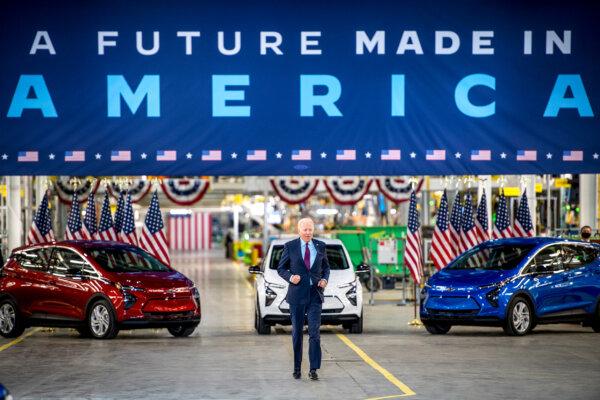The program aims to make EVs more affordable compared to standard gasoline-powered vehicles.
Americans buying electric vehicles (EVs) have saved more than $1 billion in upfront costs since January due to tax credits rolled out under the Inflation Reduction Act (IRA), the Biden administration said on Wednesday.
More than 150,000 emissions-free vehicles have been sold so far this year, according to the Treasury Department and IRS.
This translates to consumers saving an average of $1,750 annually on fuel and maintenance costs, or $21,000 of discounted savings over the typical 15-year lifespan of a vehicle, compared to a comparable gasoline vehicle, the Biden administration said.
For the more than 150,000 vehicle sales covered by the upfront discount to date, this translates to around $262 million in yearly savings on fuel and maintenance costs, and up to $3.2 billion in costs over the life of the vehicles, according to the federal government.
The Treasury Department said the cost savings mark a “major milestone” in the Biden-Harris Administration’s work to reduce transportation costs for Americans.
“President Biden’s Inflation Reduction Act is lowering costs for electric vehicle purchases, with more than $1 billion in upfront savings for American consumers since January,” said Secretary of the Treasury Janet L. Yellen.
Treasury Secretary Touts Consumer Savings
“This discount is increasing consumer choices and creating new opportunities for companies to expand their customer base,” the Treasury Secretary continued. “Consumers are saving up front and over time.”
The program aims to make EVs more affordable compared to standard gasoline-powered vehicles.
Under the plan, $7,500 in tax credits were granted to buyers of select new EVs and $4,000 on used EVs by registered at the point of sale at registered car dealers, as opposed to buyers having to claim the money back when filing their annual tax returns.

Declining Demand, Soaring Prices
Meanwhile, overall demand for EVs appears to be waning. A recent study by automotive data and analytics firm J.D. Power found that consumer interest in clean vehicles has declined over the past year; with many citing the high purchase price and lack of charging-station availability as reasoning for the rejection.
Still, EV prices are declining, according to Cox Automotive data, with average prices for new EVs dipping 9 percent in the first quarter of 2024 compared to the same period last year.
In its press release on Wednesday, the Treasury Department and IRS said clean passenger vehicle sales rose 50 percent last year from 2022 to a record 1.5 million passenger clean vehicles, including battery electric, fuel cell and plug-in hybrids.
Fuel is the largest contributor to these savings, the administration noted.
Naveen Athrappully contributed to this report.
Original News Source Link – Epoch Times
Running For Office? Conservative Campaign Consulting – Election Day Strategies!


